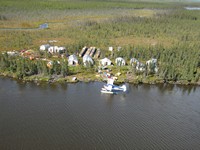 Proposed amendments to Ontario’s Mining Act aimed at smoothing relations between mining companies and First Nations have been introduced to the provincial Legislative Assembly and are expected to be in place later this year.
Proposed amendments to Ontario’s Mining Act aimed at smoothing relations between mining companies and First Nations have been introduced to the provincial Legislative Assembly and are expected to be in place later this year.
The new rules make Ontario the first jurisdiction in Canada to expressly recognize Aboriginal and treaty rights in its mining legislation, and enable a dispute resolution process to resolve conflicts between mining companies and First Nation communities.
The push to recognize Aboriginal and treaty rights followed a standoff between Plantinex Inc. and leaders of the Kitchenuhmaykoosib Inninuwug (KI) community last summer over exploration drilling near Big Trout Lake, 600 kilometres north of Thunder Bay, that led to arrests and jail sentences for KI chief Donny Morris and five other community members.
The proposed legislation withdraws significant Aboriginal cultural sites from claim staking, provides for immediate notification of Aboriginal communities following the staking of claims and requires prospectors and mining companies to notify Aboriginal communities of plans for significant exploration activities on their traditional lands.
A graduated approach to Aboriginal consultation will be based on the impact of proposed exploration activities. Prospectors and mining companies will be required to file exploration plans for lower impact activities and apply for permits for activities with higher impact. The legislation also requires awareness training as a precondition for obtaining a prospector’s license.
Plans, permits
Details relating to exploration plans and permits, consultation requirements and environmental rehabilitation will be spelled out in regulations still to be worked out.
"The Minister of Northern Development and Mines, Michael Gravelle, and his staff have done an excellent job in sticking to the scope of the changes in the Act," said Ontario Mining Association president Chris Hodgson. "Ontario has a vast geological potential and the proposed changes add clarity and certainty to investing and developing the province’s mineral resources for the benefit of all citizens."
Garry Clark, executive director of the Ontario Prospectors Association, also endorsed the amendments to the Mining Act. "As explorationists," he said, "we believe these changes will provide certainty around access to land, which will allow us to attract investment to Ontario."
The legislation also enshrines a requirement for an approved, community-based land use plan as a pre-condition for new mine development in the province’s Far North, and opens the door to a phased introduction of map staking, beginning in southern Ontario.
Additional amendments are aimed at defusing conflicts that have arisen between mineral exploration companies and surface rights holders who do not hold the mineral rights on their lands.
The proposed changes withdraw mining rights in southern Ontario where surface rights are privately held, but respect existing claims and leases. In Northern Ontario, private landholders will be able to apply for such withdrawals, but criteria such as mineral potential will be weighed as part of the approval process.
Lands with private surface rights and Crown mineral rights that are open for staking comprise only 1.4 per cent of southern Ontario’s land mass and 0.4 per cent of Northern Ontario.
Consultations
During six months of consultations, more than 1,000 people and groups participated in public and stakeholder sessions across the province. The Ministry also carried out consultations with approximately 100 Aboriginal communities to ensure the broadest possible participation.
Not everyone is happy with the proposed amendments. The Matawa First Nations, a tribal council representing nine Aboriginal communities in Northern Ontario, issued a press release condemning the government for not considering its input.
"During the consultation process, the Matawa First Nations people made it overwhelmingly clear to Ontario that any act of exploration, staking or mining activity on First Nation traditional lands without consent is intrusive of First Nations treaty rights and that consent must be sought prior to the start of any activity. Our people stated time and time again that they are willing to work together and build productive relationships with the mining industry, provided that they are duly informed of potential activities in advance of staking … Once again, the voices of our First Nations people have been shockingly ignored."
However, Union of Ontario Indians Grand Council Chief John Beaucage endorsed the legislation.
"Ontario’s new, collaborative approach to developing legislation and public policy in Ontario is certainly innovative," said Chief Beaucage. "It is respectful to the recognition of First Nations rights and indicative of Ontario’s commitment to working with First Nations on a government-to-government basis."

